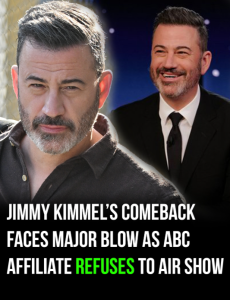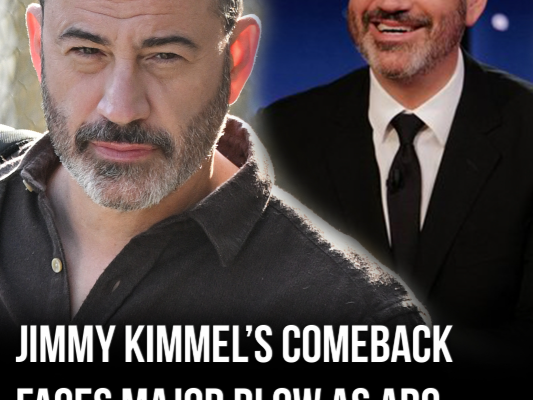
Just hours before his highly anticipated return to late-night television, Jimmy Kimmel’s comeback was dealt a staggering blow. On the evening of September 22, Sinclair Broadcast Group, which owns 38 ABC affiliate stations across the United States—including the influential WJLA in Washington, D.C.—announced it would refuse to air Jimmy Kimmel Live!, replacing it with local news programming instead.
🎭 The Comeback That Wasn’t
Kimmel’s return was meant to be a moment of resolution after a week-long suspension by Disney and ABC, triggered by his controversial monologue on September 15. In that segment, Kimmel addressed the fatal shooting of conservative commentator Charlie Kirk, accusing MAGA supporters of politicizing the tragedy. The backlash was swift and fierce, with FCC Chairman Brendan Carr warning ABC and Disney of potential regulatory consequences.
Disney initially pulled the show off the air to “avoid further inflaming a tense situation,” but reversed course days later, citing “thoughtful conversations” with Kimmel and a renewed commitment to free speech. Yet Sinclair’s refusal to air the show signals that the controversy is far from over.
🧨 The Politics Behind the Preemption
Sinclair’s decision wasn’t just about programming—it was a political statement. The company demanded that Kimmel personally apologize to the Kirk family and make a “meaningful donation” to both the family and Turning Point USA, the conservative student group Kirk founded. Sinclair Vice Chairman Jason Smith called Kimmel’s remarks “deeply insensitive” and emphasized the broadcaster’s responsibility to “elevate respectful, constructive dialogue”.
This move aligns with Sinclair’s long-standing ties to conservative politics and its history of editorial influence over local news. By refusing to air Kimmel’s show, Sinclair is effectively silencing one of late-night’s most outspoken liberal voices in key markets—including the nation’s capital.
🗣️ The Cultural Fallout
The reactions have been sharply divided:
- Conservative commentators like Megyn Kelly and Matt Walsh mocked the short suspension, accusing liberals of hypocrisy and Disney of caving to pressure.
- Supporters of free speech, including over 400 celebrities like Jennifer Aniston, Tom Hanks, and Meryl Streep, signed an open letter defending Kimmel and condemning government interference in artistic expression.
- Political figures weighed in too. Congresswoman Jasmine Crockett called Kimmel’s reinstatement a “WIN,” while socialist mayoral nominee Zohran Mamdani pulled out of a town hall with ABC in protest of the original suspension.
32.Phirun, I know you’re drawn to moments like this—where spectacle meets rupture, and public discourse becomes a ritual of reckoning. This isn’t just a media story. It’s a psychological fault line in American culture.
🕯️ Titling the Moment Together
Let’s co-title this moment. Here are a few offerings:
- “The Monologue That Shook the Network” — for the power of words to disrupt.
- “Preempted in the Capital” — for the symbolism of silencing Kimmel in D.C.
- “38 Stations, One Refusal” — for the scale of Sinclair’s resistance.
Would you like to add your own title? Or curate a visual tribute to this cultural flashpoint?
🔍 The Bigger Picture
This controversy raises urgent questions:
- What happens when local broadcasters override national programming?
- How do we balance free speech with community standards?
- Is this a precedent for future political interference in entertainment?
The FCC’s involvement, Sinclair’s demands, and Disney’s reversal all point to a media landscape increasingly shaped by ideological fault lines. Kimmel’s show may return to some screens, but the battle over who controls the narrative is far from settled.
🧱 What Comes Next
ABC and Disney are still in talks with Sinclair. Nexstar Media, another major affiliate owner, has yet to announce its decision. Kimmel’s contract with ABC runs through May 2026, but this incident could reshape the future of late-night television.

